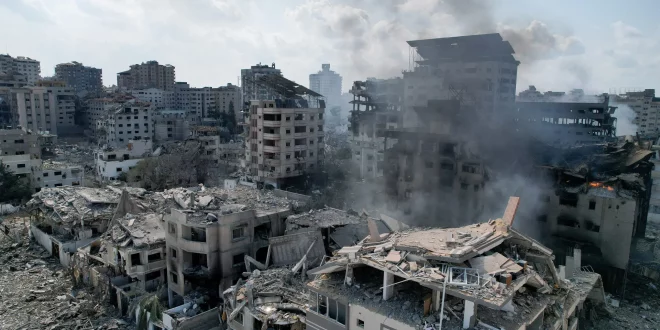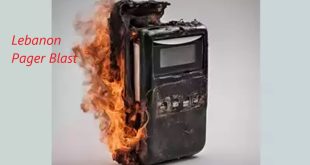L’Express, the French newspaper, explores five scenarios for the Middle East after the Gaza war in its coverage of Israel’s war with the Hamas.
In June 2009, at Bar-Ilan University in Tel Aviv, Benjamin Netanyahu outlined his vision for peace with the Palestinians: “Two nations living freely together in friendship and mutual respect, each with its own flag, national anthem, and government. None of them threatening the safety or survival of the other.”
However, Express highlighted these remarks, stating, “The individual who uttered these words, even if the conditions were not accepted by the Palestinians at that time, is not adhering to his commitment today when it was crucial for him to uphold his promise at all costs.”
In the 2015 Knesset election campaign, Netanyahu declared that there would be no Palestinian state during his tenure. The entry of the extreme right into his cabinet at the end of 2022 seemed to further solidify his hardline stance.
The newspaper observed that the situation has grown increasingly complex since the beginning of the Operation Al-Aqsa Storm on October 7. The ongoing conflict between Israel and Hamas has resulted in thousands of casualties and extensive destruction in Gaza, which has a population of 2.3 million.
Over 80% of Gaza’s population has been forced to relocate, with the majority seeking refuge in the southern part of the Gaza Strip. The humanitarian conditions in this area are distressing, and prospects for the release of new prisoners are dwindling with each passing day.
L’Express further notes, “Nevertheless, before engaging in any discussions, the conflict must come to a halt. Unfortunately, it appears that we are far from reaching that point. On December 9, a day after the United States vetoed a UN resolution calling for an ‘immediate humanitarian ceasefire’ in Gaza, Benjamin Netanyahu declared that Israel would persist in its campaign to dismantle Hamas. However, he did not specify a timeline for achieving this objective. Even if Israel manages to defeat Hamas fighters and conclude the military conflict, eradicating their ideology remains an insurmountable challenge.”
Ghaith al-Omari, a former Palestinian negotiator and current researcher at the Washington Institute, asserts that if Hamas is defeated, there is a high likelihood of extremist ideologies gaining significant traction among Palestinians in Gaza. Al-Omari emphasizes the importance of utilizing the post-conflict period to present a more appealing political alternative to Hamas and to initiate the peace process. However, he warns that without the reconstruction of Gaza, the Palestinian Authority may remain weak, discredited, and corrupt. This scenario, according to al-Omari, could lead to Hamas gaining more power, making the organization stronger, which is considered a more probable outcome than other possibilities.
Within Israel, there is an anticipation for the conclusion of the war and for the individuals responsible to face trial and accountability. The prospect of Prime Minister Netanyahu navigating a war fact-finding committee seems challenging, and it is difficult to envision his survival in such circumstances. Nevertheless, Netanyahu has demonstrated a knack for extricating himself from similar predicaments in the past. Additionally, there is speculation that potential diplomatic achievements, such as the historic agreement with Saudi Arabia, could serve as a lifeline for Netanyahu in this challenging situation.
On the other hand, the region faces a heightened peril—the escalation of conflicts. While the Gaza war persists, Hezbollah in Lebanon maintains its threat to Israel along the northern border.
L’Express suggests that the dismantling of Hamas could lead to increased direct involvement in a conflict, particularly by Lebanon’s Hezbollah and Iran. This shift is perceived to align more with Hezbollah’s preferences.
The situation in the West Bank, where over 260 Palestinians have lost their lives since October 7, may also deteriorate. There is even the possibility that Hamas is considering opening another front against the Israeli army.
In this scenario, tension in certain Arab countries, like Jordan, is on the rise with escalating demonstrations. The populations of Saudi Arabia, Egypt, and Jordan express anger, while their leaders are advocating for a ceasefire, recognizing the potential threat the Gaza war poses to regional stability.
Towards the conclusion of L’Express, it is emphasized that regardless of the war’s outcome and the evolving situations in Gaza and Israel, it is unmistakably clear that both Gaza and Israel, as well as the broader region, will undergo profound transformations. Even in the highly improbable event of Hamas’s defeat and active regional participation in peace-building, reconstructing Gaza, and fortifying self-governing entities, the landscape is destined to be significantly altered.
 Arab24 اخر اخبار الوطن العربي
Arab24 اخر اخبار الوطن العربي




